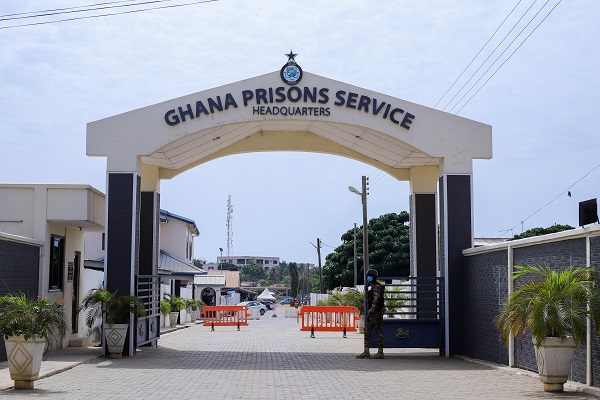
Husbands abandon wives serving jail terms in Ghana
Female inmates in the various prison facilities are often abandoned and not given the needed care and attention by their husbands while in prison custody.
The male inmates who are serving jail terms do not receive similar treatment from their wives.
Advertisement
The Chief Public Relations Officer of the Ghana Prisons Service, Chief Superintendent of Prisons (CSP) Courage Atsem, who disclosed this to The Mirror, said the situation tended to affect the female inmates psychologically.
He, therefore, appealed to husbands not to neglect their wives when they were thrown into jail as that was not helpful.
“I will appeal to the husbands not to abandon their wives when they are in prison since they will need a lot of care and support to go through the process. What is worrying is that sometimes it is because of the man that these women find themselves in the prisons. So it becomes psychological torture for the women when that happens,” he said.
Mr Atsem also appealed that “when our own kith and kin finish serving their jail terms, society should gladly receive them and help them resettle, otherwise people will continue to come here.
“There have been instances where people are informed of when they will be going home, but they become moody and are not happy because society may not accept them,” he explained.
Conjugal rights
Responding to some concerns from the public that inmates should be allowed to enjoy conjugal rights or visits while serving their terms, the Prisons Chief Public Relations Officer said the laws of the country did not permit that.
He added that if a law was passed and the necessary provisions made, the service would be obliged to comply.
A conjugal visit is a scheduled period in which an inmate of a prison or jail is permitted to spend several hours or days in private with a visitor, usually their legal spouse in which they can be allowed to have sex.
Conjugal visits are allowed in many prisons in different parts of the world including Australia, Brazil, Canada, Denmark, Germany, India, Israel, Mexico, Russia, Saudi Arabia, and Spain.
However, it is not permitted under Ghana’s laws.
Under Ghana’s legal regime, a prisoner can only be released from prison in three ways — a successful appeal against their conviction, Presidential pardon or after they have completed serving their term.
“As we speak our laws have not made provision for conjugal rights for prisons, so we don’t allow that. But if a law is passed and the necessary facilities are provided, we are mandated to do so.”
“I think it will just enhance our human rights records, and not to motivate people to commit crimes to be brought in here. And I believe we can get to that point where a law could be passed for prisoners to enjoy conjugal rights,” he said.
Accusations
Mr Atsem dismissed the impression that some officers had sexual intimacy with prisoners, noting that it was not possible “but once a while there are stories of sodomy mostly in the male cells, but it is not rampant as it is being portrayed or reported in sections of the media”.
“Moreover, the prisoners themselves have a subculture that frown on sodomy in addition to the prison service’s own internal mechanisms in dealing with the situation, so that help minimises the tendency that people may have.”
"He also indicated that male and female inmates were hardly allowed to meet since their cells were separate from each other except on special occasions or functions. They all use different washrooms as well. So it is also entirely impossible for male and female inmates to have sex.”
On the kind of crimes committed by both male and females, Mr Atsem said they were usually the same, “but generally it is stealing that topped for both male and females.”
Pregnant inmates
There are currently seven female prisons across the country. As of April 12, 2021, the total female population was 143. Out of that Nsawam Female Prisons held 75; Akuse, six; Sekondi Female Prisons, 19; Kumasi, 18; Ho, eight; Sunyani, eight; and Tamale, 10.
Mr Atsem maintained that no inmate had been impregnated while in prison, rather some come in already pregnant. “The service has the mandate to cater for them including antenatal care and childbirth."
He said nursing mothers were usually separated from the ‘normal’ prisoners and kept in baby friendly units where they were catered for until their babies were two years old, weaned off and given to a family member or the Department of Social Welfare.
Congestion
Compared to the male prisons, the female centres do not have congestion problems.
“For instance, at Nsawam, out of the capacity of 200 at the female side, there are currently only 75 inmates in there. Akuse has a capacity of 12 but currently has six. But all the male sides are congested.
Meanwhile, out of the 44 prison facilities across the country, male inmates were 12,851 as of April 12, 2021.
The current male to female ratio is 90:1.
Feeding
On the general feeding situation in the prisons, Mr Atsem said the current amount of GH₵1.80 allotted for feeding inmates daily was woefully inadequate.
He, therefore, called for upward adjustment.
“What we have been using to support is the supplements from the government and the produce from our farms. But due to the coronavirus situation, we hardly go to the farm and accept donations from people, since we want to reduce contacts as much as possible.”
“We appeal to well-meaning Ghanaians and philanthropists to come on board to help us out of this situation,” he said.
He further called on family members and non-governmental organisations to support the feeding of pregnant and lactating mothers in the holding centres.
Writer's email: [email protected]/ [email protected]



